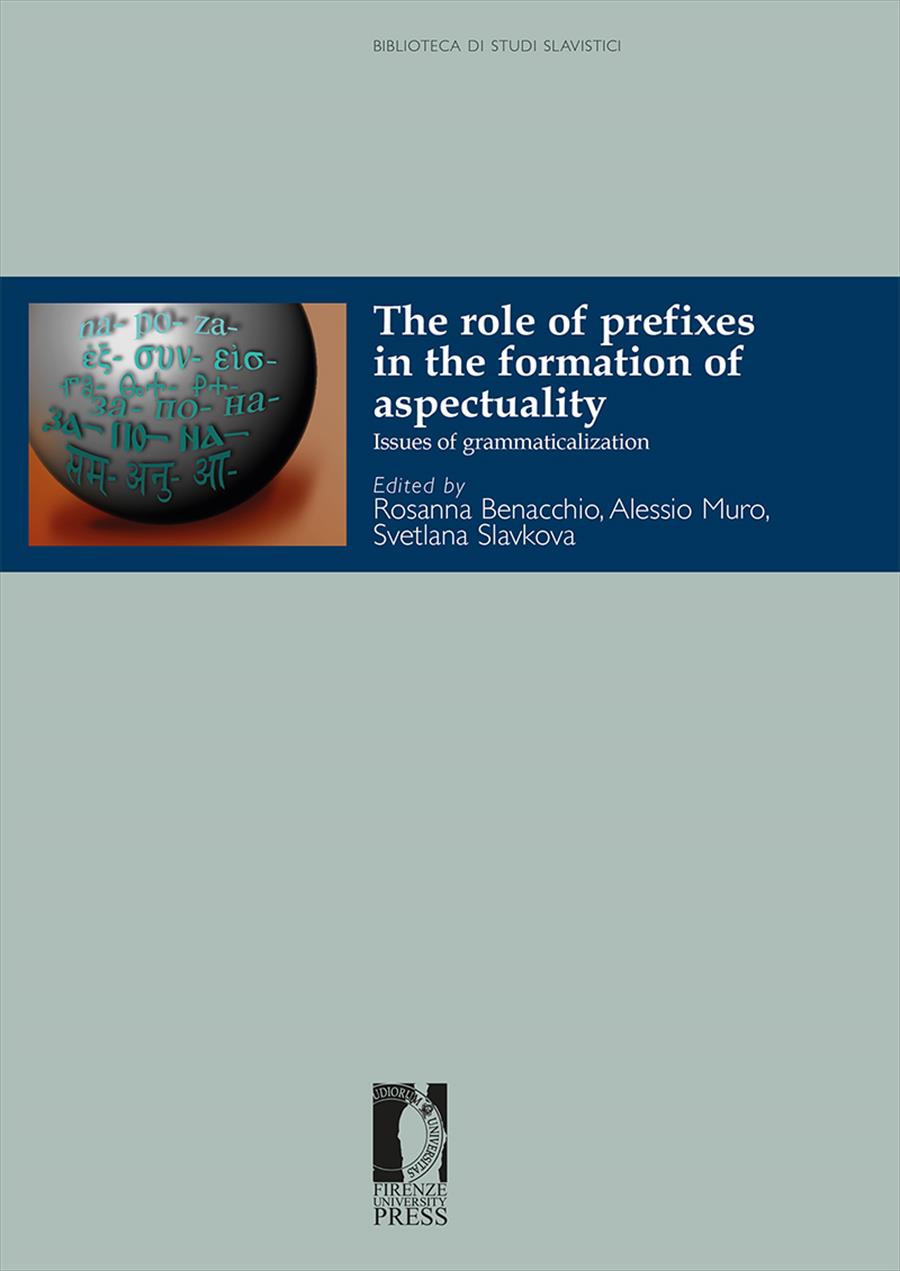- The role of prefixes in the formation of aspectuality
- Edited by Rosanna Benacchio, Alessio Muro, Svetlana Slavkova
Cross-linguistic considerations on preverb stacking (with special reference to Bulgarian)
- Alessio Muro
- © 2017 Author(s) |
- CC BY 4.0
- DOI: 10.36253/978-88-6453-698-9.10
The term preverb stacking (PS) designates the co-occurrence on one verbal base of two or more prefixes bearing spatial, aspectual, or quantificational meanings. The phenomenon is especially productive in Slavic but is also attested in other Indo-European and non-Indo-European languages. This paper provides a first attempt at a cross-linguistic typology of PS. It will also pay attention to problems typical of Slavic (i.e. the interaction of PS and the aspectual value of the verb in terms of the typical Slavic perfective vs. imperfective dichotomy). Special attention will be paid to Bulgarian.
- Keywords:
- Preverbs,
- verbal prefixes,
- stacking,
- aspect,
- Bulgarian,
Hankuk University of Foreign Studies, Korea (the Republic of) - ORCID: 0000-0003-2794-7686
- Atanasova, A.N. 2011. Poliprefigirani glagoli v săvremennija bălgarski knižoven ezik (Ph.D. diss.). Bӑlgarska Akademija na Naukite.
- Baker, M.C. 1996. The Polysynthesis Parameter. Oxford.
- Casad, E.H. 1982. Cora Locationals and Structured Imagery (Ph.D. diss.). University of California, San Diego.
- Casad, E.H. 1984. Cora, in Studies in Uto-Aztecan grammar 4: Southern Uto-Aztecan grammatical sketches. R.W. Langacker (ed.). Arlington (TX): 155-459.
- Casad, E.H., Langacker, R.W. 1985. “‘Inside’ and ‘outside’, in Cora grammar”. International Journal of American Linguistics, 51.3: 247-281.
- Imbert, C. 2010. “Multiple preverbation in Homeric Greek: a typological insight”. CogniTextes, 4. <http://cognitextes.revues.org/387#text>.
- Istratkova, V. 2004. “On Multiple Prefixation in Bulgarian”. Nordlyd, 32.2: 301-321. <http://septentrio.uit.no/index.php/nordlyd/issue/view/8>.
- Ludwig, J. 1995. Multiply Prefixed Verbs in Russian, Polish, and Ukrainian (Ph.D. diss.). Indiana University.
- Mithun, M.M. 1999. The Languages of Native North America. Cambridge.
- Nevins, J.A. Joseph, B.D. 1993. “Wackernagel affixes: evidence from Balto-Slavic”. Yearbook of Morphology 1992: 93-111.
- Papke, J.K.P. 2010. Classical Sanskrit Preverb Ordering: A Diachronic Study (Ph.D. diss.). Ohio State University.
- Rojzenzon, L.I. 1974. Mnogopristavočnye glagoly v russkom i drugich slavjanskich jazykach. Samarkand.
- Smith, C.S. 1991/1996. The Parameter of Aspect. Dordrecht.
- AA.VV. 1970. Slovar’ russkich narodnych govorov, vol. 6. Leningrad.
- Tatevosov, S. 2008. “Intermediate prefixes in Russian” in Formal approaches to Slavic linguistics 2007. A. Antonenko, C. Bethin, J. Baylin (eds.). Ann Arbor: 423-442.
Chapter Information
Chapter Title
Cross-linguistic considerations on preverb stacking (with special reference to Bulgarian)
Authors
Alessio Muro
Language
English
DOI
10.36253/978-88-6453-698-9.10
Peer Reviewed
Publication Year
2017
Copyright Information
© 2017 Author(s)
Content License
Metadata License
Bibliographic Information
Book Title
The role of prefixes in the formation of aspectuality
Book Subtitle
Issues of grammaticalization
Editors
Rosanna Benacchio, Alessio Muro, Svetlana Slavkova
Peer Reviewed
Number of Pages
272
Publication Year
2017
Copyright Information
© 2017 Author(s)
Content License
Metadata License
Publisher Name
Firenze University Press
DOI
10.36253/978-88-6453-698-9
ISBN Print
978-88-6453-697-2
eISBN (pdf)
978-88-6453-698-9
eISBN (xml)
978-88-9273-128-8
Series Title
Biblioteca di Studi Slavistici
Series ISSN
2612-7687
Series E-ISSN
2612-7679
